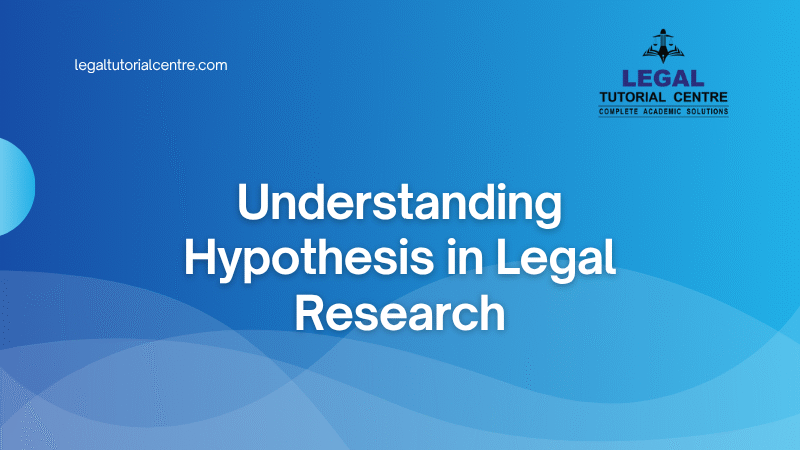- Introduction
A hypothesis is a foundational component in the research process. In legal research, it provides a tentative explanation or assumption about a legal issue, principle, or relationship that the researcher aims to explore or verify. It guides the entire research process and helps in drawing valid conclusions.
- Definition of Hypothesis
A hypothesis is a proposed or assumed statement made on the basis of limited evidence as a starting point for further investigation.
In legal research, a hypothesis refers to a logical assumption or educated guess about a legal problem, rule, or principle, which the researcher sets out to test using statutory analysis, case law study, or empirical data.
3. Features of a Good Hypothesis
A good hypothesis should be clear and unambiguous. It must focus on a specific legal issue or relationship. It should be testable or verifiable using legal methods, such as analysis of statutes, judicial decisions, or empirical evidence. It must be relevant to the research objectives and should be stated in simple and understandable language. Most importantly, a hypothesis should lead to further investigation and not be a mere opinion or belief.
4. Types of Hypotheses in Legal Research
There are several types of hypotheses used in legal research:
Descriptive Hypothesis: This type simply describes the characteristics of a legal phenomenon or issue. For example, a researcher may assume that most PILs (Public Interest Litigations) are related to environmental concerns.
Relational Hypothesis: It suggests a relationship between two or more variables. For example, there may be a link between the rise in social media use and the increase in defamation cases.
Causal Hypothesis: This type proposes a cause-and-effect relationship between two legal variables. For instance, it may suggest that stricter bail laws reduce the chances of repeat offenses.
Null Hypothesis: This states that there is no relationship between two legal variables. For example, it may assume that legal aid services do not affect the accessibility of justice for the poor.
Alternative Hypothesis: This is the opposite of the null hypothesis and states that there is a significant relationship. For example, it may suggest that legal aid significantly improves access to justice for the underprivileged. - Importance of Hypothesis in Legal Research
The hypothesis serves as a guide or roadmap for the researcher. It helps in determining the scope of the study and focusing the investigation on a particular legal issue. It facilitates the collection of relevant legal materials such as statutes, case laws, and opinions. It assists in testing legal doctrines and identifying trends in judicial decisions. Additionally, it ensures objectivity and a logical structure to the research process, avoiding unnecessary diversions.
- Difference between Hypothesis and Research Question
A hypothesis is a declarative statement that predicts a relationship or outcome, whereas a research question is interrogative and seeks to find or explore something.
For example, a research question might be: “Does stricter sedition law suppress free speech?”
Whereas the corresponding hypothesis would be: “Stricter sedition laws suppress free speech in India.”
The hypothesis is tested or examined through legal reasoning, case analysis, and statutory interpretation
- Examples of Hypothesis in Legal Research
1. “The implementation of fast-track courts reduces the pendency of rape cases in India.”
2. “The Right to Education Act has improved school enrolment rates in rural areas.
3. “Constitutional amendments affecting the basic structure are invalid under Indian law.”
4. “Criminalizing marital rape would enhance the protection of women’s rights under Article 21.”
5. “Cybercrime laws in India are inadequate to tackle data privacy violations.”
8. Conclusion
A hypothesis plays a critical role in shaping the course of legal research. It helps the researcher form a rational assumption and test it through various methods such as doctrinal or empirical research. By providing a focus, direction, and framework, a well-crafted hypothesis not only adds value to the research but also help in recommendation, legal reform , clarifying legal principles and understanding the impact of law in society


